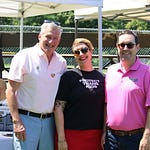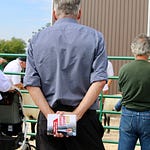The book is available in print, ebook and audio book formats.
[Chapter One] [Chapter Two] [Chapter Three] [Chapter Four]
What is wrong with Pierre Poilievre?
If I’ve done my marketing right, you’re the kind of reader who’ll react to this chapter title with a heartfelt “there’s a well with no bottom!”
I want to be a little more specific than that.
When he began looking for someone who might be interested – if that’s the word – in taking on the role of Liberal candidate in Poilievre’s riding of Carleton, Bruce Fanjoy started to ponder his legacy in the riding because that’s the kind of guy he is.
Whereas some people might throw themselves into an adventure and figure it out as they go – the consecrated political expression for this is “building the plane in the air” – Fanjoy starts by drawing a mental map of the field.
Who are the players? What does the landscape look like? What have people done so far? What should they have done instead? What can a challenger bring to the table that might get the attention of constituents?
He likes to do his research. He even read my then-most recent book (in the original French because he’s no slouch) to get a better idea of who I am. That’s something.
All this to say he thought long and hard about his opponent’s track record in the riding, because he took the mission seriously. He wasn’t just going to dismiss Poilievre as having done nothing significant for the riding in 20 years without researching the matter thoroughly.
Once that was done, he half-joked that he should write an article with a title that reads “Pierre Poilievre’s accomplishments in Carleton” and leave the page blank.
I mean, there isn’t much to talk about when you get right down to it. Pierre Poilievre always had national ambitions. That’s not shocking to realize. He didn’t become a politician to be the best local representative he could be.
To be fair, you meet people in the riding who say Poilievre was a good constituency MP because he (or his staff) helped solve a problem they were having.
I’m not here to invalidate their experience. But looking after constituents who need help with an issue or an answer to their question is pretty basic.
Fanjoy knew that whoever took on the Conservative leader in Carleton would have to be solid and qualified. That’s true of every successful candidate everywhere. But there was another requirement – the person would have to be able to make a very strong case to voters that having a party leader as their MP was nowhere near good enough if that MP ignored the riding beyond the absolute bare minimum. Which, Fanjoy thought, was the case in Carleton.
Anyone going against Poilievre would have to know the latter’s weak points and failings. And how to use that to counter the natural advantage that simple name recognition continues to bring.
It was particularly important to go beyond the obvious – that his tone was too aggressive, or that his policies were too conservative. Voters in the riding who never voted for Poilievre weren’t the ones Fanjoy needed to convince.
He needed to reach beyond typical Liberal voters and talk to right-leaning, conservative and undecided voters. To persuade them, Fanjoy would need arguments that were demonstrably true, reasonable and measured. If you’re campaigning against Pierre Poilievre because he’s too aggressive and strident, it’s not a good idea to be just as aggressive and strident from the other side of the political spectrum.
Not that Liberals are especially leftist. But you know what I mean. The idea behind the campaign to unseat Pierre Poilievre wasn’t so that Bruce Fanjoy would find himself a new job as MP. It was to use positivity and kindness to knock down toxicity and Trumpism and make sure they didn’t put down roots in Canada.
Fanjoy knew that once Poilievre had won the leadership of the Conservative Party with the help of the truckers and Ottawa occupiers that he’d publicly supported, he was no ordinary opponent. The whole convoy vibe and energy was with him. Poilievre had never been a genteel politician. He’d made his reputation as an attack dog, and he was good at it.
Mark Bourrie, in his excellent book Ripper: The Making of Pierre Poilievre, offers many examples of Poilievre’s hardline politics throughout the years, including his opposition to same-sex marriage in the first decade of the century. He voted against Paul Martin’s equal marriage, despite his father being in a committed same-sex relationship.
But now that he’d earned himself the support of convoy people, Poilievre’s unpleasantness was on steroids.
I don’t need to tell you that if you are a progressive voter, it’s hard to find anything good about Pierre Poilievre. You probably don’t like many of his policy ideas, and you sure don’t care for his tone. Eventually, Fanjoy realized nobody in Liberal Party circles wanted to take on Poilievre.
This wasn’t surprising or unreasonable. The odds of winning were not overwhelming, to put it mildly. It would be a long, arduous, lonely slog. And remember, in 2023, we did not know when the next election would be, except that it would be in the fall of 2025 at the very latest. It turned out to have been pretty close to the latest.
Finding someone with the background, energy and optimism necessary to beat Poilievre would be hard enough. But asking that person to take a long break from their job, too? And be absent from home on many weekends and weeknights to meet constituents? Without pay?
Fanjoy gradually talked himself into giving it a shot. He was fortunate that he was retired and did not need to leave a job. He was also very grateful that his wife Donna, who doesn’t want to be in the spotlight and is far too nice for politics, nevertheless supported him fully in this crazy adventure. She, too, understood how necessary it was for good people to stand in the way of Poilievre becoming prime minister.
One thing Fanjoy knew was that he would have to work very hard to get to know as many of the people in the riding as possible. And he would have to do a whole lot of listening. How else would he know what people’s issues and concerns were?
Fanjoy, with some help from his early team of supporters, identified a few key criticisms of Poilievre that he could highlight when speaking with residents of the riding. That he’d built zero houses in Carleton while he was minister responsible for housing under Stephen Harper, that he’d voted against military pay increases, but also that he’d voted in favour of raising the age of retirement for Canadians despite the fact that he had personally qualified for a full government pension at 31.
He wasn’t going to ignore the advantages Poilievre had, stemming from having represented the area for over 20 years and being the leader of the opposition in the Commons. But Fanjoy’s strategy from the beginning has been to point out the obvious: That both he and Poilievre would start the election campaign with zero votes each. He repeated the line early and often. Eventually it began to stick.
Also? It’s not because someone has been successful for two decades that their future success is guaranteed. Sometimes, people want change. And isn’t that what Poilievre campaigned on at the national level? This was probably my favourite part. The candidate of change got turfed for the exact same reason he wanted to dislodge Justin Trudeau from the prime minister’s job.
Near the very end of the campaign, when stories started to come out in the news about Carleton possibly turning red, you could hear Conservative spokespeople say there was no truth to those rumours, that they felt very confident about Poilievre keeping his seat. That’s fair game, just spokespeople doing their job.
One Manotick resident had a reaction that spoke volumes. This person – I will not repeat her name, because I want to spare her the embarrassment – was quoted in the Ottawa Citizen saying Poilievre “owns the area.”
Maybe I’m wrong to read arrogance in that sentence (it could be spectacular rhetorical clumsiness), but I did. The sentiment expressed is also an epic misunderstanding of how elections work. Members of Parliament don’t “own” their constituents or their seat in the legislature. Sure, they can buy the actual chair when they retire, if they want to keep it as a souvenir. But at that point the chair no longer represents anybody.
MPs earn the support of their constituents not to be their lord but their servant. It’s unhealthy – and I would say slightly Trumpian – to get confused about that very basic part of representative democracy.
Most people, thankfully, didn’t go quite as far as this woman who seemed proud to be owned, but there was no shortage of people telling Bruce Fanjoy he “couldn’t” run against Pierre Poilievre, like it was somehow illegitimate to even try.
I’ve done competitive fighting, and I’ve been covering politics for a long time. I understand shit-talking. I’m pretty decent at it myself. It’s part of the game and we all enjoy it up to a point. Where it becomes difficult to accept is when it’s used to discourage people from running against your favourite politician.
That’s especially disturbing when the politician in question has so few accomplishments to his name. Why wouldn’t most voters (except for Poilievre’s die-hard fans, I suppose) be at least a little bit curious to hear from someone else? We all know lack of competition in the marketplace brings consumers fewer options, more expensive products, and shitty service. Why would we tolerate monopolies in representative democracy?
Outside of politics, Poilievre has never done anything. Literally. He never had another job. He was first elected to the House of Commons at the age of 25 and has been there ever since. He’s a very experienced politician, but he has no other experience.
Fanjoy would use that to his advantage, too.
The 2025 campaign was different than most of us could have imagined. I don’t think anyone, even in the fall of 2024, had Trump tariffs and the 51st state issue being as important and critical as they were.
And yet.
For Fanjoy, the moment that stood out the most in the last year was the sudden resignation of Chrystia Freeland in mid-December 2024. The woman who had been finance minister and deputy prime minister was signalling, strongly, that she no longer had confidence in Justin Trudeau, who would resign less than a month later.
At that point, the Liberals had been trailing the Conservatives badly in the polls for the better part of two years. Fanjoy had been battling headwinds the whole time in his local campaign to unseat Pierre Poilievre, but when Freeland resigned, those winds became a full-blown storm.
The day after her resignation, Fanjoy had obligations that prevented him from going door knocking. By the time he went back out, the weather was terrible – one of those days when you never know if it’s going to rain, or snow, or sleet, or some nasty combination of all three. It was practically a metaphor for the moment.
The reaction at the door was revelatory, Fanjoy says. It seemed to give people hope that he wasn’t giving up despite the chaos – or the weather. Neighbours welcomed him in, talked to him, and offered him the encouragement he needed to keep going.
That is perhaps the best example of how positive energy feeds on itself and builds up to become a force strong enough to defeat just about anything. It is one of the most important lessons of this whole experience, and what I hope readers take away from this short book.
The 2025 campaign was not a referendum on Pierre Poilievre’s record. It was very much about the future and who could deal with Donald Trump, housing affordability, and public safety. In the interest of fairness, I still want to list measures that Poilievre introduced while he was in the House of Commons. And who knows, maybe in future campaigns we’ll get an opportunity to debate some of those.
Shortly after being elected, in 2005, he introduced a private member’s bill, C-414, titled An Act to prevent the Government of Canada from charging rent to non-profit hospitals. It aimed to do exactly as its title said.
It was defeated, which prompted the Conservative government to reduce the rent to the Queensway-Carleton Hospital to one dollar a year.
Poilievre also sponsored Bill C-383, An Act to allow the recall of members of the House of Commons that got defeated, and Bill C-456, An Act to amend the Criminal Code (parental responsibility) that sought to make it an offence “for parents or guardian of a person under the age of eighteen years to contribute, through negligence, inappropriate action or lack of appropriate action, to behaviour that leads the person to commit an offence.” That one didn’t make it through either.
Poilievre served as Parliamentary Secretary to the President of the Treasury Board between 2006 and 2013, under Stephen Harper. After that he was Democratic Reform Minister (2013-2015), and Employment and Social Development Minister for a few months, before the Liberals won the October election later that year.
In his role as Parliamentary Secretary to the President of the Treasury Board, Poilievre helped oversee what was commonly known as the Harper government’s whistleblower reforms. That work included meeting with American lawmakers, and reportedly considering a US-style bounty system for whistleblowers who sue companies that defraud the government.
The Federal Accountability Act became law in December 2006. Among other things, it implemented some of the recommendations from the Gomery Commission and established new independent oversight offices including that of Parliamentary Budget Officer.
Later, as Minister for Democratic Reform, Poilievre introduced Bill C-23, the Fair Elections Act. This one became law in June 2014 and attracted a lot of criticism for the imposition of new voter ID requirements, and for minimizing the role of Elections Canada in encouraging voting.
Many of those measures were later reversed by the Trudeau government. Of note, none of the other parties in the House supported C-23.
Perhaps the thing electors in Carleton might remember the most is the expansion of the childcare benefit program, which Poilievre announced in the summer of 2015 as he went on a well-publicized hunt to find families that might have been missing out on this payment.
That’s for his accomplishments. On the other side of the ledger, Pierre Poilievre has had to apologize more than once for behaviours that, frankly, reinforce the view many of us have that he’s not in politics to help his constituents so much as to help himself get as much power as possible.
In 2008, in the lead-up to Stephen Harper’s public apology for the harm caused by the residential school system, Poilievre went on the radio to say that instead of compensations, what Indigenous people really needed was to find the value of hard work. He apologized. Something he also had to do after he crashed security on Parliament Hill instead of waiting to be cleared by RCMP, like everyone else does.
In a career this long, there’s bound to be both positive and negative. But by reviewing Pierre Poilievre’s career, one is struck by how little he seems to care about the people in his riding.
While knocking on doors in Carleton and speaking with real electors, Fanjoy heard concern in their voice that their MP was mostly absent from the riding, busy chasing support from elsewhere — including among people who participated in the convoy and occupation of Ottawa in early 2022.












